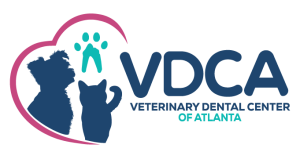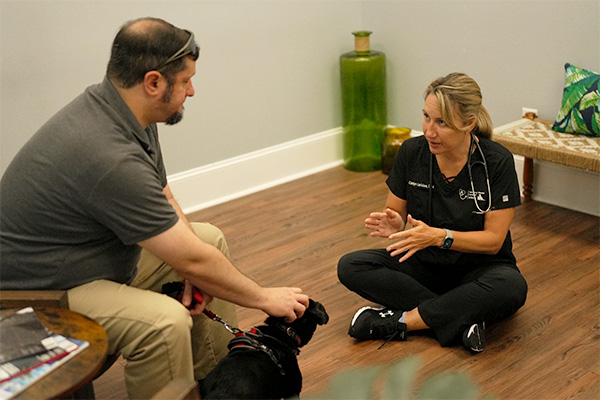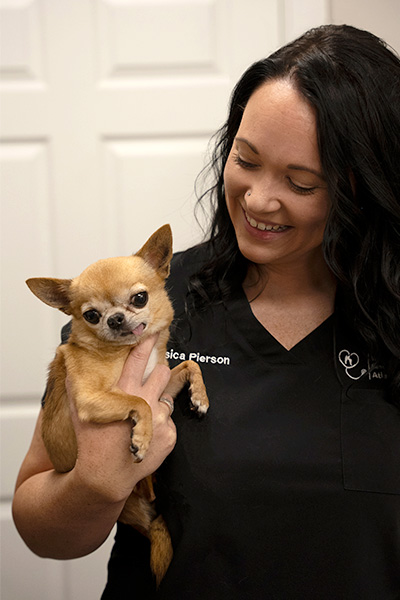Pet Dental Cleanings
At Veterinary Dental Center of Atlanta, we understand the vital role dental health plays in the overall well-being of your pet. Dental diseases can lead to serious health issues ranging from tooth loss to infections that can spread to major organs, affecting your pet’s quality of life. Our state-of-the-art pet dental cleaning services are designed to provide the best care and prevent these diseases.
Why Pet Dental Cleanings are Important
At Veterinary Dental Center of Atlanta, we understand the vital role dental health plays in the overall well-being of your pet. Dental diseases can lead to serious health issues ranging from tooth loss to infections that can spread to major organs, affecting your pet’s quality of life. Our state-of-the-art pet dental cleaning services are designed to provide the best care and prevent these diseases.
Why Pet Dental Cleanings are Important
Pet dental cleanings are essential for several reasons:
-
Prevention of Dental Diseases
Regular cleanings help prevent the development of periodontal disease, an infection of the tissues surrounding the teeth. This is the most common dental condition in dogs and cats and can lead to painful infections, loss of teeth, and can spread to other organs.
-
Removing Tartar and Plaque
Cleaning removes tartar and plaque that can build up on pets’ teeth. Plaque is a film of bacteria, and if it’s not removed, it hardens into tartar, which can lead to gum disease and tooth decay.
-
Overall Health
There is a well-documented link between oral and systemic health. Poor dental hygiene can lead to more significant health issues, including heart, liver, and kidney disease, due to the spread of bacteria from the mouth to other parts of the body.
-
Pain Reduction
Animals often hide pain. Dental issues can cause significant discomfort that pet owners might not immediately detect. Cleanings help keep their mouths healthy and pain-free.
-
Early Detection of Problems
Regular dental check-ups and cleanings allow veterinarians to detect early signs of issues that might not be visible to the pet owner, such as broken teeth, gum disease, or even tumors.
-
Fresh Breath
Regular cleanings also help combat halitosis (bad breath) in pets, which can indicate underlying dental or gum issues.
Regular dental care can significantly contribute to a pet’s comfort and longevity, preventing more severe health issues and maintaining their quality of life.
Our Dental Cleaning Process
Pre-Cleaning Exam: Every dental cleaning begins with a thorough examination by one of our experienced veterinarians. This helps us assess the health of your pet’s mouth and determine the most appropriate treatment plan.
Anesthesia: For your pet’s safety and comfort, we perform dental cleanings under anesthesia. This allows for a thorough cleaning both above and below the gum line and reduces stress.
Oral Assessment and Charting: A thorough oral assessment is performed using full mouth series dental radiographs and a thorough oral exam by probing each tooth. Any abnormal findings are then charted, along with any treatments that are recommended and/or performed.
Scaling and Polishing: Our highly skilled dental technicians use a variety of hand and electric instruments to thoroughly remove plaque and tartar buildup from above AND below the gum line, as well as, between the teeth, where tooth brushes and other dental home care treatments cannot access. After scaling, the teeth are polished to create a smooth surface that is more resistant to plaque buildup.
Post-Cleaning Care: After the cleaning, we provide detailed instructions for home care and schedule follow-up appointments to ensure your pet’s mouth remains healthy and clean.
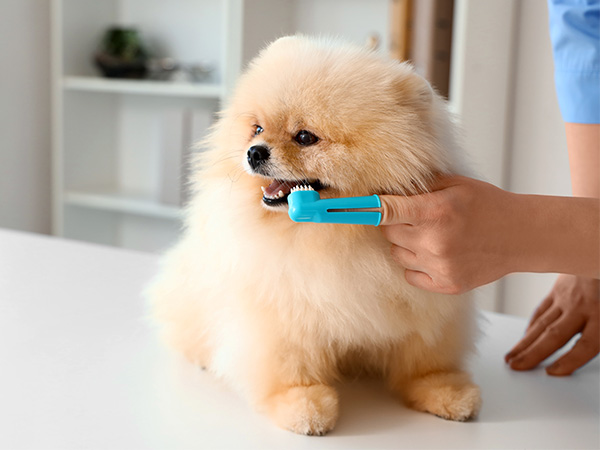
Dog Teeth Cleaning
Dental care for dogs is crucial as they are prone to developing a myriad of oral disease including periodontal disease, fractured teeth, endodontic disease, and oral tumors which can have serious health implications. Our dog-specific dental procedures focus on removing plaque and calculus buildup, checking for any signs of dental and oral abnormalities, and maintaining overall oral health. We also provide advice on how to maintain dental hygiene at home, including the use of specific dog-friendly dental home care products.
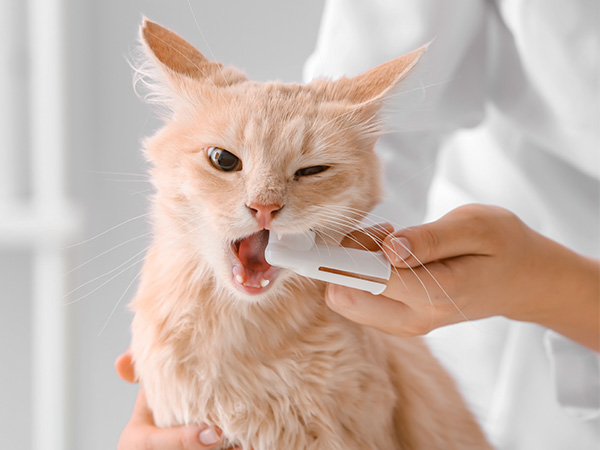
Cat Teeth Cleaning
Cat dental care is equally as crucial, as they are particularly excellent at hiding oral pain and disease. They are also prone to developing a variety of painful and overall health-impacting oral diseases such as gingivitis, stomatitis, periodontal disease, and tooth resorption. Our cat dental cleanings are designed to be gentle yet effective, addressing the unique needs of feline oral health. We also focus on educating owners on the subtle signs of dental pain in cats and how to manage dental health through regular cleanings and appropriate dental home care choices for their individual cats needs.
Schedule a Pet Dental Cleaning Appointment
Don’t wait for dental disease to affect your pet’s health. Contact us today to schedule a dental cleaning appointment. Our friendly staff is here to answer any questions and guide you through the process of securing the best dental care for your pet.
Frequently Asked Questions
Dog Dental Cleanings
Q: Do dogs need dental cleaning?
A: Yes, regular dental cleanings are essential for maintaining your dog’s oral health, preventing periodontal disease, and avoiding potential systemic health issues related to poor dental hygiene.
Q: How often do dogs need dental cleaning?
A: Most dogs benefit from annual dental cleanings. However, more frequent cleanings might be necessary depending on your dog’s breed, oral health, and previous dental history. We recommend discussing your dog’s specific needs with our veterinarian.
Q: What to feed a dog after dental cleaning?
A: After a dental cleaning, it’s best to feed your dog soft foods, or kibble softened with water, especially if extractions or oral surgery was performed. This should continue for a couple of weeks until your dog’s mouth has healed. We will provide specific feeding instructions based on your dog’s individual needs post-procedure.
Cat Dental Cleanings
Q: Do cats need dental cleaning?
A: Absolutely! Cats are prone to dental issues such as calculus buildup, gingivitis, periodontal and other oral diseases. Regular dental cleanings with a thorough oral assessment can prevent these problems and help keep your cat healthy.
Q: How often do cats need dental cleaning?
A: The frequency of dental cleanings in cats can vary based on their overall oral health, but generally, a professional cleaning and assessment is needed at least once a year. Of course, we will make recommendations based on the specific needs of your cat.
Q: What to feed a cat after dental cleaning?
A: After a dental cleaning, it’s best to feed your cat soft foods or kibble softened with water, especially if extractions or oral surgery was performed. This should continue for a couple of weeks until your cat’s mouth has healed. We will provide specific feeding instructions based on your cat’s individual needs post-procedure.
General
Q: Does pet insurance cover dental cleanings?
A: Many pet insurance policies cover dental cleanings, either fully or partially, as part of their wellness or preventive care offerings. Coverage details can vary by provider and plan.
Q: What pet insurance covers dental cleaning?
A: Some popular pet insurance companies that offer plans covering dental cleanings include Petplan, Nationwide, and Embrace. We advise pet owners to compare plans and speak directly with insurance providers to find the best coverage options for their needs.
Q: Are there any risks associated with pet dental cleanings?
A: While any procedure involving anesthesia carries minimal risks, the benefits of dental cleanings far outweigh these risks. Our clinic uses the most advanced and safe anesthesia protocols, and we closely monitor all pets during and after the procedure.
Q: What should I expect after my pet’s dental cleaning?
A: Pets usually recover quickly from dental cleanings. You may notice some grogginess due to anesthesia, and if teeth were extracted, your pet might experience some discomfort which can be managed with medications we provide. We’ll give you detailed care instructions for recovery.
